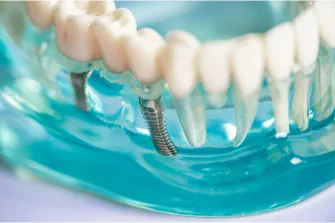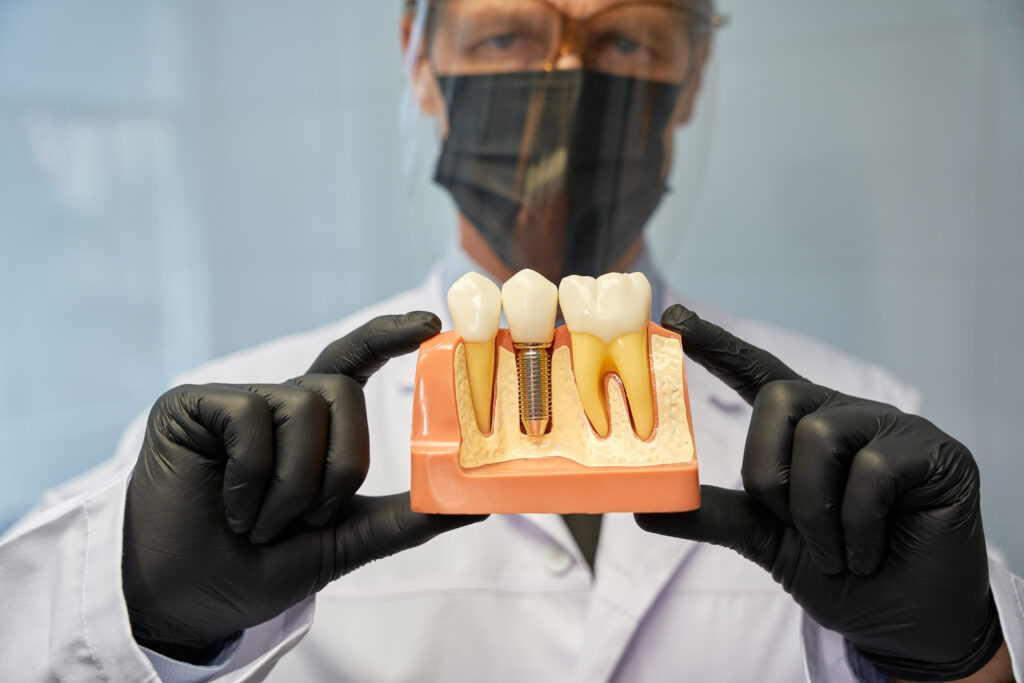
Are you thinkingHow about enhancing your smile or dealing with dental issues requiring a permanent solution? Titanium dental implants might be your answer. As a frontrunner in dental restoration, these implants offer a durable and effective solution for missing teeth, providing aesthetic and functional benefits. This comprehensive guide will walk you through everything you need to know about titanium dental implants, from their unparalleled benefits to the procedure and success rates. You’ll find valuable insights here whether you’re a potential patient or a dental professional.
Have you ever wondered why titanium is the gold standard in dental implants and what makes it superior to other materials?
Key Takeaways
- Titanium implants are renowned for their strength, durability, and natural appearance, making them a top choice in dental restoration
- The implantation process is methodical, involving several stages from initial consultation to final crown placement
- With a success rate exceeding 95%, titanium implants are one of the most reliable options available
- When compared to alternatives like zirconia, titanium outshines in strength and biocompatibility
- Understanding the biocompatibility and osseointegration of titanium can help you appreciate its effectiveness in dental health
Benefits of Titanium Dental Implants
Titanium dental implants are celebrated for their exceptional benefits, bringing a remarkable blend of strength, appearance, and longevity to the table. These implants are crafted to withstand the test of time, making them a reliable choice for those seeking a permanent solution to tooth loss. The unique properties of titanium allow it to integrate seamlessly with the human body, ensuring a natural and comfortable fit.
Titanium implants offer unparalleled strength and durability, which are crucial for long-term dental health. Unlike other materials that may wear down or fracture over time, titanium remains robust and intact, providing a reliable foundation for dental restorations. This strength enables the implants to handle the daily pressures of chewing and biting, making them an excellent choice for anyone looking for a dependable solution.
Moreover, the natural appearance of titanium implants is a significant advantage. They blend seamlessly with your existing teeth, ensuring your smile looks as natural and appealing as possible. This aesthetic benefit is often a deciding factor for many individuals considering dental implants, as it allows them to regain their confidence and smile without hesitation.
Another noteworthy aspect is titanium’s lightweight nature, ensuring comfort and ease of patient adaptation. This property is particularly beneficial for those who may have concerns about the feeling of foreign objects in their mouths. The lightweight nature of titanium reduces the sensation of having an implant, making it more comfortable for the patient. The corrosion resistance of titanium is another feather in its cap, as it ensures longevity even in the harsh oral environment, where moisture and bacteria are ever-present.
Lastly, the high success rates associated with titanium implants make them a preferred choice among dental professionals. The ability of titanium to bond with bone, a process known as osseointegration, contributes significantly to the stability and success of the implant. With these implants, you’re not just getting a tooth replacement—you’re investing in a lasting solution that enhances your oral health and quality of life.
Process of Getting Titanium Dental Implants
Embarking on the journey to restore your smile with titanium dental implants involves a series of well-coordinated steps, each designed to ensure a successful outcome. The process might seem intricate, but understanding each stage can ease any apprehensions you might have.
The journey begins with an initial consultation, where your dental professional thoroughly examines your oral health. During this visit, you’ll discuss your dental history, existing conditions, and expectations for the procedure. This step is crucial as it lays the foundation for a personalized treatment plan tailored to your needs.
The implant placement procedure is scheduled once the consultation is complete and you’re deemed a suitable candidate. Typically performed under local anesthesia, this procedure lasts about one to two hours. The dental professional meticulously places the titanium implant post into the jawbone, providing a sturdy anchor for the future crown. Though the idea of surgery might sound daunting, rest assured that advancements in dental technology have made this procedure more comfortable and efficient than ever.
Following the placement, the healing period, known as osseointegration, begins. This stage, which spans several months, is vital for the success of the implant. Osseointegration is the process where the implant fuses with the jawbone, creating a solid and stable foundation for dental restoration. Regular follow-up appointments with your dentist are essential during this phase to monitor the healing process and address any concerns.
The final step in the process involves placing the dental crown. This restoration not only restores your tooth’s full functionality but also completes your smile’s aesthetic transformation. The crown is custom-made to match the color and shape of your natural teeth, ensuring a seamless blend. At this point, you’ll be able to enjoy a beautiful and functional set of teeth with the confidence that your titanium implants are built to last.
Success Rates of Titanium Dental Implants
Titanium dental implants have garnered a stellar reputation in the dental community due to their impressive success rates. These implants boast a success rate of over 95%, making them one of the most reliable options for dental restoration. But what contributes to this high success rate?
A significant factor is patient adherence to post-operative care. Following your dentist’s instructions diligently can dramatically enhance the success rates of your titanium implants. This involves maintaining good oral hygiene, attending regular follow-up appointments, and avoiding habits that could jeopardize the implant, such as smoking or neglecting dental care.
The role of experienced dental professionals cannot be overstated. Their skill and precision during the implant placement are critical in ensuring the implant’s stability and longevity. Advances in technology and techniques have further bolstered the success rates, allowing for more precise placement and improved outcomes.
Moreover, the longevity of titanium implants often surpasses that of alternative materials, contributing to their success. Titanium remains steadfast, unlike other materials that may degrade or fail over time, providing a durable and reliable solution. Reviews and comments from patients who have opted for titanium implants frequently highlight the long-term benefits and satisfaction derived from these implants.
When considering dental restoration, weighing the potential for implant failure is essential. While no procedure is without risk, the low incidence of complications with titanium implants makes them a favored choice. This reliability is a testament to the quality and effectiveness of these implant systems, providing peace of mind to patients and dental professionals alike.
Comparison of Titanium to Other Dental Implant Materials
In the world of dental implants, titanium stands out as a leader, often compared to other materials like zirconia and ceramic. So, what makes titanium the preferred choice for many?
Firstly, titanium’s superior strength sets it apart. While ceramic and zirconia implants have their merits, they fall short in terms of durability and resilience. Titanium’s robust nature allows it to withstand the daily wear and tear of chewing and biting, ensuring a longer lifespan for the implant.
The biocompatibility of titanium is another significant advantage. This property reduces the risk of rejection and allergic reactions, making it a safer choice for a broader range of patients. The versatility of titanium also allows for a wide range of dental restoration options, accommodating various needs and preferences.
Maintenance is another area where titanium shines. Titanium implants typically require less upkeep than other materials, offering patients convenience and peace of mind. This low-maintenance aspect, coupled with their durability, makes titanium implants a practical and cost-effective option.
From a cost perspective, titanium implants often present a more affordable solution. While the initial investment may be higher than some alternatives, the longevity and reliability of titanium offer value over time. This cost-effectiveness is a key consideration for patients and dental professionals when choosing implant material.
Biocompatibility of Titanium Implants
The biocompatibility of titanium is one of its most celebrated features, playing a pivotal role in the success of dental implants. But what exactly does biocompatibility mean in this context?
Biocompatibility refers to the material’s ability to integrate with the body without causing adverse reactions. Titanium excels in this regard, ensuring a minimal risk of allergic reactions or other negative responses. This characteristic makes titanium ideal for dental implants, as it promotes a harmonious relationship between the implant and surrounding tissue.
The body’s acceptance of titanium implants is crucial to their high success rates and longevity. When the body readily accepts the implant, the chances of complications diminish significantly, leading to a smoother and more successful healing process.
Another benefit of titanium’s biocompatibility is its ability to promote natural bone growth and integration. This property not only enhances the stability of the implant but also supports the health of the surrounding bone and tissue. The strong bond formed between titanium and bone tissue further strengthens the implant, providing a solid foundation for dental restorations.
Additionally, the minimal inflammatory response associated with titanium ensures patient comfort during the healing process. This aspect is vital for patient satisfaction and contributes to the overall success of the implant. By choosing titanium implants, you’re opting for a solution that prioritizes both your oral health and comfort.
Osseointegration and Titanium Implants

Osseointegration is a cornerstone of successful dental implants, and titanium’s unique properties make it particularly effective in this process. But what exactly is osseointegration, and why is it so important?
Osseointegration involves the direct attachment of the implant to the bone, ensuring stability and long-term success. This process is crucial for the implant’s functionality, as it provides the necessary support and strength to withstand daily use. Titanium’s unique properties, such as its ability to bond with bone, make it an ideal choice for promoting successful osseointegration.
The healing process during osseointegration forms a strong foundation for dental restoration. As the bone gradually integrates with the implant, it creates a stable and secure base for the dental crown. This stability is essential for maintaining the implant’s functionality and appearance over time.
Surface treatment of titanium implants further enhances osseointegration, improving outcomes for patients. These treatments, which may involve modifying the implant’s surface texture, promote faster and more effective integration with the bone. The result is a stronger, more reliable implant that offers a natural feel and functionality.
Successful osseointegration contributes to patients’ overall satisfaction, as it ensures the implant feels and functions like a natural tooth. This natural feel is a significant advantage, allowing patients to eat, speak, and smile confidently. By choosing titanium implants, you’re opting for a solution that prioritizes function and comfort.
Durability of Titanium Dental Implants
Regarding dental implants, durability is a critical factor, and titanium excels in this area. But what makes titanium so durable, and why is it the preferred choice for dental restorations?
Titanium’s resilience is a key reason for its popularity in dental implants. Its ability to withstand chewing and biting forces ensures that the implant remains intact and functional over time. Unlike other materials that may fracture or degrade, titanium’s strength provides a dependable solution for dental restoration.
The corrosion resistance of titanium is another factor contributing to its long-term durability. In the oral environment, where moisture and bacteria are constant, titanium’s resistance to corrosion ensures that the implant remains unaffected by these elements. This property enhances the implant’s longevity and maintains its appearance and functionality.
Titanium implants often outlast other materials, providing lasting value for patients. This longevity is a significant advantage, as it reduces the need for frequent replacements or repairs, saving time and money. Proper care and maintenance further enhance the durability of titanium implants, allowing them to serve as a reliable solution for years.
For those seeking a long-term investment in their dental health, the reliability of titanium implants makes them a sound choice. By opting for titanium, you choose a material that prioritizes durability and offers peace of mind. Investment in titanium implants pays off in terms of both functionality and satisfaction.
Complications and Side Effects of Titanium Implants

While titanium dental implants are remarkably successful, being aware of potential complications and side effects is essential. Understanding these possibilities can help you make informed decisions about your dental health.
Possible complications include infection, implant failure, and nerve damage, though these are rare. Infection can occur if bacteria enter the implant site during or after surgery, leading to inflammation or other issues. However, skilled dental professionals employ techniques to minimize this risk, ensuring a smooth and successful procedure.
Regular follow-up appointments play a crucial role in identifying and addressing potential side effects early. By attending these appointments, you can catch any issues before they escalate, ensuring the long-term success of your implant. Your dentist will monitor the healing process and make any necessary adjustments to your treatment plan.
The majority of patients experience minimal discomfort and a smooth recovery process. This is due in part to the biocompatibility of titanium, which reduces the risk of adverse reactions. Understanding potential risks empowers patients to make informed decisions about their dental health, leading to greater satisfaction and peace of mind.
Skilled dental professionals are your best ally in minimizing the risk of complications with titanium implants. Their expertise and attention to detail ensure that each step of the process is executed with precision, reducing the likelihood of issues. Choosing a reputable dental professional sets you up for a successful outcome and a healthy smile.
Conclusion
Titanium dental implants offer a robust and reliable solution for those seeking to rejuvenate their smile and improve their oral health. From their exceptional durability and natural appearance to their impressive success rates, titanium implants stand as a testament to modern dental innovation.
Choosing titanium means investing in your dental future with a material that promises strength, longevity, and biocompatibility. As you consider your options, remember that the expertise of your dental professional is just as crucial as the material you choose. If you’re ready to explore the benefits of titanium dental implants further, don’t hesitate to reach out to your local dental professional or contact our Harbison Office at (215) 331-7585 for personalized guidance.
So, what do you think? Are you ready to take the plunge and transform your smile with titanium dental implants? Share your thoughts and experiences in the comments below!
Frequently Asked Questions
What are titanium dental implants?
Titanium dental implants are metal posts that are surgically placed into the jawbone to act as artificial tooth roots. These implants provide a strong foundation for fixed or removable replacement teeth.
How long do titanium dental implants last?
With proper care and maintenance, titanium dental implants can last a lifetime. Regular dental check-ups, good oral hygiene practices, and avoiding damaging habits like smoking can help prolong the lifespan of your implants.
Are titanium dental implants safe?
Yes, titanium dental implants are considered safe and have been used in dentistry for decades. Titanium is a biocompatible material, meaning it is well-tolerated by the human body and has a high success rate in dental implant procedures.
What is the process for getting titanium dental implants?
The process for getting titanium dental implants typically involves a consultation with a dental specialist, a thorough examination of your oral health, implant placement surgery, and a period of healing before the final restoration is attached. Your dentist will provide detailed instructions and guidance throughout each step of the process.
Can anyone get titanium dental implants?
Most healthy adults are good candidates for titanium dental implants. However, factors such as overall health, oral hygiene, bone density, and lifestyle habits may affect your eligibility for the procedure. It is best to consult with a dental professional to determine if titanium dental implants are the right choice for you.







